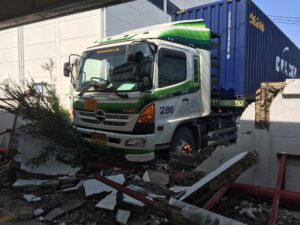
When is the Shipping Company Liable?
Delivery truck drivers may cause serious accidents when they violate traffic laws and motor carrier regulations. However, in addition to negligent drivers, you can hold shipping companies responsible for traffic accidents.
If you suffered injuries in a delivery truck accident, an experienced truck accident attorney near you can determine the appropriate legal claim to file on your behalf, identify all potentially responsible parties, and pursue the monetary compensation you deserve.
While some injured accident victims may pursue compensation from their own insurance companies through a Personal Injury Protection (PIP) claim – depending upon their jurisdiction – other accident victims may involve the negligent delivery truck driver or shipping company’s insurer.
Your Brandon truck accident lawyer will handle all of the necessary legal steps for you to maximize the monetary compensation you receive for your injuries and losses.
How do Delivery Truck Drivers and Others Cause Accidents?
Delivery truck accidents can result from various factors and may pose serious risks to other drivers and pedestrians.
Some of the most common causes of delivery truck accidents include:

- Exceeding the posted speed limit – Pressures to meet tight delivery schedules may lead to speeding and other traffic law violations, making it challenging for delivery truck drivers to react quickly to unexpected roadway situations or traffic changes.
- Driver fatigue – Long hours and demanding schedules can lead to delivery truck driver fatigue, affecting their concentration, coordination, and reaction times. Fatigued delivery truck drivers are more prone to making errors that cause and contribute to serious accidents.
- Reckless driving – Reckless and aggressive driving behaviors, such as tailgating other vehicles, disregarding traffic signals, and weaving in and out of busy highway traffic without using turn signals, often contribute to accidents involving delivery trucks.
- Distracted driving – Delivery truck drivers sometimes become distracted with navigation systems, mobile phones, and other devices while on the road, increasing the risk of serious accidents.
- Inadequate truck driver training – Insufficient training in navigating through traffic, handling delivery trucks, loading/unloading cargo, and adhering to safety protocols can contribute to accidents – especially among less-experienced delivery drivers. In some cases, shippers and carriers are responsible for failing to train and supervise their drivers properly.
- Improper loading and unloading procedures – Incorrectly loaded or unsecured cargo can affect a large delivery truck’s stability, potentially leading to accidents, spills, or rollovers. Loose cargo may also slide off the back of a truck and into the road, causing a serious collision with oncoming vehicles.
- Blind spots – Larger blind spots on delivery trucks, especially when backing up or changing lanes, can increase the risk of collisions with other vehicles, cyclists, or pedestrians.
- Vehicle maintenance issues – Poorly maintained delivery trucks, including issues with brakes, tires, or other essential components, increase the risk of mechanical failures and accidents. Shippers and carriers are frequently responsible for ensuring that their vehicles are in good working order at all times.
- Illegal parking and stops – Illegally parked or stopped delivery trucks can obstruct traffic flow, leading to accidents as other drivers maneuver around them.
If you suffered injuries in a truck accident that resulted from a delivery driver or shipping company’s negligent behavior, you need to speak with an experienced truck accident lawyer near you today. Your attorney can identify all potentially responsible parties for your accident and work to secure the monetary recovery you deserve for your losses.
Can You Hold a Shipper Responsible for a Delivery Truck Accident?
A shipper may be legally liable for a delivery truck accident under certain circumstances, particularly if the shipper’s actions or negligence contribute to the occurrence.
Legal liability may arise from:
- Imposing unrealistic schedules – Shippers may contribute to accidents by imposing tight delivery schedules that encourage carriers or drivers to engage in unsafe practices, such as speeding or exceeding allowable hours of service. Unrealistic schedules can be a form of negligence for which the shipper may ultimately be responsible.
- Inadequate screening and monitoring – Shippers should screen and monitor carriers to maintain proper safety standards, regularly inspect their vehicles, and comply with all applicable regulations. Failing to conduct thorough screening or ongoing monitoring may result in liability if the carrier’s negligence leads to a traffic accident.
- Unsafe loading practices – If the shipping company is responsible for loading or unloading the cargo onto a delivery truck, they must do so in a manner that ensures stability and safety. Poorly loaded or unsecured cargo can contribute to serious accidents, and the shipper may ultimately be responsible for negligence in loading/unloading practices.
- Failing to provide adequate information – Shippers are often responsible for providing accurate and complete information about the nature of the cargo, including any special handling requirements. Failure to communicate such information can lead to accidents, and the shipper may be liable for not providing essential details.
- Negligent selection of a carrier – Shippers are responsible for choosing reputable and safe carriers for transporting their goods. If a shipper fails to perform due diligence in selecting a reliable carrier with a history of safety compliance, they may be responsible if an accident subsequently occurs.
- Negligent contractual agreements – The terms of contractual agreements between shippers and carriers can affect legal liability. If the shipper’s contract encourages unsafe practices or places undue pressure on carriers, they may be legally responsible for accidents resulting from these agreements.
If a shipper’s actions or negligence contributed to your delivery truck accident, a knowledgeable truck accident attorney in your area may pursue legal action against the shipper to seek compensation for all of your accident-related losses.
Common Injuries that Occur in Delivery Truck Accidents
Victims of delivery truck accidents can suffer a range of injuries due to the large size and weight of these vehicles. The severity of injuries often depends upon factors such as the speeds of the involved vehicles, the type of accident that occurs, and the safety measures in place.
Some of the most common injuries that victims suffer in delivery truck accidents include:
- Neck and whiplash injuries
- Traumatic head and brain damage
- Broken bones
- Internal bleeding
- Internal organ damage
- Back and spinal cord injuries
- Complete and incomplete paralysis injuries
- Soft tissue injuries
- Open cuts and lacerations
- Psychological injuries
- Burn injuries
- Crush injuries
Seeking immediate medical attention is crucial for victims of delivery truck accidents – even if the injuries initially appear minor. Early diagnosis and treatment contribute to better recovery outcomes, and documenting injuries is essential for any potential legal claims for compensation.
An experienced delivery truck accident lawyer in your area can begin gathering the documents necessary to prove your case while you focus on attending medical appointments and getting better.
Recovering Financial Compensation for Losses in a Delivery Truck Accident
In delivery truck accidents, the law may entitle victims to recover various types of financial compensation to cover their losses and damages resulting from the accident.
Recoverable financial compensation typically falls into several categories, including:

- Pain and suffering – Non-economic damages, such as pain and suffering, cover the physical and emotional distress that victims experience due to a delivery truck accident. This compensation is subjective and aims to address the intangible toll of the accident on the victim’s overall life and well-being.
- Property damage – Victims may also recover the costs of repairing or replacing damaged property, including their vehicles and personal belongings.
- Medical expenses – Victims can seek compensation for medical costs incurred due to injuries sustained in their delivery truck accident. These damages include compensation for all related hospital bills, medications, medical procedures, rehabilitation (including physical therapy), and ongoing medical care.
- Lost income and lost earning capacity – Monetary compensation for lost income addresses the income that accident victims may have missed while attending medical appointments and recovering from their injuries. Additionally, if the accident results in a diminished ability to earn income in the future, accident victims may pursue financial compensation for their loss of earning capacity.
- Emotional anguish – Accident victims may seek compensation for emotional distress and mental anguish resulting from the traumatic experience of a delivery truck accident. This includes anxiety, depression, and other psychological effects of the accident.
- Permanent disfigurement or disability – If a delivery truck accident results in a disability or disfigurement, victims may be entitled to compensation for the physical and emotional consequences of these lasting injuries, including the costs of future care.
- Loss of consortium – Loss of consortium compensates accident victims for the negative effects the accident has on their relationships with family members, including children and spouses.
- Rehabilitation and therapy costs – Victims of delivery truck accidents may also recover costs associated with rehabilitation services, physical therapy, and other necessary treatments to facilitate their recovery.
Also, in cases where a delivery truck accident leads to a fatality, surviving family members may pursue various wrongful death damages. These damages may include monetary compensation for funeral expenses, loss of financial support, and loss of the decedent’s guidance, care, comfort, and companionship.
An experienced personal injury attorney can estimate the value of your delivery truck accident case and take the necessary steps toward settlement or litigation.
Successfully Litigating a Delivery Truck Accident Case
Litigation may become necessary in a delivery truck accident case if the insurance company refuses to compensate the accident victim fairly or denies fault for the accident altogether.
Litigating a delivery truck accident case successfully involves careful preparation, strategic legal maneuvers, and a thorough understanding of the complexities surrounding these cases.
An experienced delivery truck accident attorney may take all of the following actions during the litigation stage of your case.
- Initiate a prompt and comprehensive investigation to gather crucial evidence, including accident reports, written witness statements, and any available surveillance footage.
- Engage expert witnesses, such as accident reconstruction specialists or medical professionals, to provide testimony that strengthens your case.
- Scrutinize the qualifications and driving history of the delivery truck driver and investigate factors such as training, licensing, adherence to applicable regulations, and any prior incidents of negligence or misconduct by the driver.
- Evaluate the delivery truck company or shipper’s compliance with industry regulations.
- Document instances of negligence on the part of the delivery truck driver, carrier, or shipper, including potential traffic law violations, failure to maintain the vehicle, or inadequate training protocols in place
- Establish a clear link between the driver, carrier, or shipper’s actions or negligence and the injuries that you suffered.
- Calculate and document all economic and non-economic damages you suffered, including all related medical expenses, lost income, pain and suffering, and any long-term or permanent disabilities.
- Explore opportunities for settlement through negotiation.
- Thoroughly prepare your case for trial by compiling all evidence, identifying key witnesses, and developing a persuasive case strategy to present in court at a civil jury trial or bench trial.
- Present a compelling case in court by introducing evidence, calling witnesses to testify, and making convincing arguments supporting your case.
- Explore alternative dispute resolution methods (ADR), such as mediation or binding arbitration, instead of taking your case to a civil trial.
Successfully litigating a delivery truck accident case requires a combination of legal experience, meticulous preparation, and effective advocacy.
By building a strong case grounded in evidence and expert testimony, you may obtain just compensation for your injuries and losses resulting from your delivery truck accident.
Moreover, your delivery truck accident lawyer can handle every step of the litigation process for you and advise you to make informed and intelligent decisions at all stages of the proceedings, including whether to accept a pending settlement offer from the insurance company or take your case to a civil jury trial or ADR proceeding.
Talk With a Knowledgeable Truck Accident Attorney About Your Legal Matter Today

If you or someone you love recently suffered injuries in a delivery truck accident that a negligent delivery driver, carrier, or shipping company caused, you have legal options. A skilled truck accident attorney in your jurisdiction can determine the options available to you and take the appropriate legal steps to maximize your overall monetary recovery.
Case evaluations with an injury lawyer are free, so you can learn about your legal options at no cost with no risk. Seek your free consultation now.
Request A Free Consultation Today!
Boohoff Law Brandon Office
330 Pauls Drive, Ste. 222
Brandon, FL 33511











